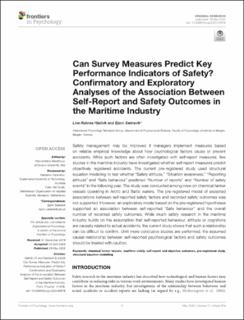Can Survey Measures Predict Key Performance Indicators of Safety? Confirmatory and Exploratory Analyses of the Association Between Self-Report and Safety Outcomes in the Maritime Industry
Journal article, Peer reviewed
Published version

Åpne
Permanent lenke
https://hdl.handle.net/11250/2763129Utgivelsesdato
2020Metadata
Vis full innførselSamlinger
- Department of Psychosocial Science [862]
- Registrations from Cristin [10402]
Sammendrag
Safety management may be improved if managers implement measures based on reliable empirical knowledge about how psychological factors cause or prevent accidents. While such factors are often investigated with self-report measures, few studies in the maritime industry have investigated whether self-report measures predict objectively registered accidents. The current pre-registered study used structural equation modelling to test whether “Safety attitude,” “Situation awareness,” “Reporting attitude” and “Safe behaviour” predicted “Number of reports” and “Number of safety events” in the following year. The study was conducted among crew on chemical tanker vessels operating in Arctic and Baltic waters. The pre-registered model of expected associations between self-reported safety factors and recorded safety outcomes was not supported. However, an exploratory model based on the pre-registered hypotheses supported an association between self-reported “Safe behaviour” and the overall number of recorded safety outcomes. While much safety research in the maritime industry builds on the assumption that self-reported behaviour, attitude or cognitions are causally related to actual accidents, the current study shows that such a relationship can be difficult to confirm. Until more conclusive studies are performed, the assumed causal relationship between self-reported psychological factors and safety outcomes should be treated with caution.
